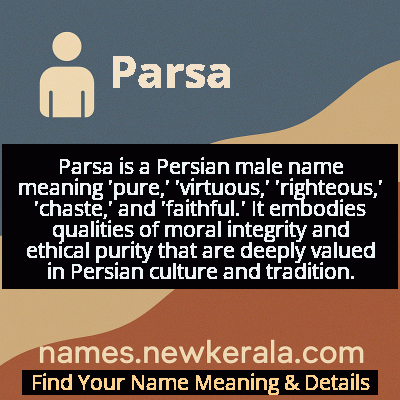Parsa Name Meaning & Details
Origin, Popularity, Numerology Analysis & Name Meaning of Parsa
Discover the origin, meaning, and cultural significance of the name PARSA. Delve into its historical roots and explore the lasting impact it has had on communities and traditions.
Name
Parsa
Gender
Male
Origin
Persian
Lucky Number
1
Meaning of the Name - Parsa
Parsa is a Persian male name meaning 'pure,' 'virtuous,' 'righteous,' 'chaste,' and 'faithful.' It embodies qualities of moral integrity and ethical purity that are deeply valued in Persian culture and tradition.
Parsa - Complete Numerology Analysis
Your Numerology Number
Based on Pythagorean Numerology System
Ruling Planet
Sun
Positive Nature
Leaders, ambitious, highly driven, self-reliant, innovative.
Negative Traits
Overly aggressive, domineering, impatient, selfish.
Lucky Colours
Red, orange, gold.
Lucky Days
Sunday.
Lucky Stones
Ruby, garnet.
Harmony Numbers
2, 3, 9.
Best Suited Professions
Entrepreneurs, managers, engineers.
What People Like About You
Courage, determination, leadership.
Famous People Named Parsa
Parsa Venkateshwar Rao Jr
Journalist and Political Analyst
Renowned Indian journalist and columnist known for his insightful political commentary
Parsa Kaffash
Entrepreneur and Business Leader
Iranian-American tech entrepreneur and founder of successful software companies
Parsa Aghili
Academic and Researcher
Prominent Iranian scholar in computer science and artificial intelligence research
Parsa Shams
Artist and Designer
Contemporary visual artist known for blending traditional Persian motifs with modern digital art
Name Variations & International Equivalents
Click on blue names to explore their detailed meanings. Gray names with will be available soon.
Cultural & Historical Significance
In contemporary Persian culture, the name serves as a living link to this glorious heritage while maintaining relevance in modern society. It represents the continuity of Persian identity through centuries of historical changes and cultural evolution. The name is particularly cherished among families who value their cultural roots and wish to pass on the noble qualities associated with ancient Persian civilization to new generations. Parsa symbolizes not just individual virtue but collective cultural pride and the enduring spirit of Persian civilization that has influenced world history, art, and philosophy for over two millennia.
Extended Personality Analysis
Individuals named Parsa are typically characterized by their strong moral compass and unwavering integrity. They possess a natural inclination toward righteousness and often serve as moral anchors in their social and professional circles. Parsas tend to be deeply principled people who make decisions based on ethical considerations rather than convenience or personal gain. Their purity of intention makes them trustworthy and reliable, qualities that others instinctively recognize and value. They approach life with seriousness of purpose and a commitment to doing what is right, even when faced with difficult choices or opposition.
In interpersonal relationships, Parsas are known for their loyalty and faithfulness. They form deep, meaningful connections and maintain them with consistent care and attention. While they may not be the most outwardly expressive individuals, their actions consistently demonstrate their commitment to those they care about. Professionally, Parsas often excel in roles that require ethical judgment, responsibility, and trustworthiness. They have a natural authority that comes not from assertiveness but from their demonstrated integrity and consistent character. Their chaste nature extends beyond romantic contexts to include purity of thought, speech, and action in all aspects of life.
Modern Usage & Popularity
In contemporary naming practices, Parsa maintains a respected position within Iranian and Persian diaspora communities as a name that beautifully balances traditional significance with modern appeal. While it remains most popular in Iran, the name has gained recognition internationally through globalization and the spread of Persian culture. The name's usage patterns show it to be particularly favored by educated, urban families who value both cultural heritage and global citizenship. Recent decades have seen consistent but moderate usage, avoiding the extremes of being either overly common or obscure. Among second and third-generation Iranians living abroad, Parsa serves as an important cultural marker that connects children to their heritage while providing a name that works well in multicultural environments. The name's straightforward pronunciation and spelling make it accessible to non-Persian speakers, contributing to its steady popularity across different regions and communities.
Symbolic & Spiritual Meanings
Symbolically, Parsa represents the quintessential ideal of moral and spiritual purity within Persian cultural consciousness. The name carries deep metaphorical significance as embodying the untainted essence of human character - someone who remains true to their core values regardless of external circumstances. In Persian poetic tradition, the concept of 'purity' associated with Parsa extends beyond mere moral cleanliness to encompass clarity of purpose, transparency in relationships, and authenticity in self-expression. The name also symbolizes cultural continuity, representing how ancient Persian virtues have been preserved and transmitted through generations while adapting to contemporary contexts. Metaphorically, Parsa can be seen as a living embodiment of the Persian cultural soul - maintaining its distinctive identity while engaging with the modern world, much like the enduring legacy of Persian civilization itself that has influenced global culture while retaining its unique character.

